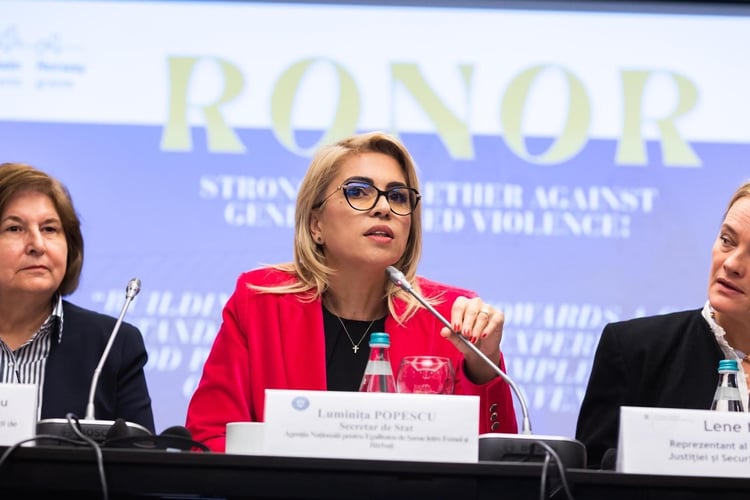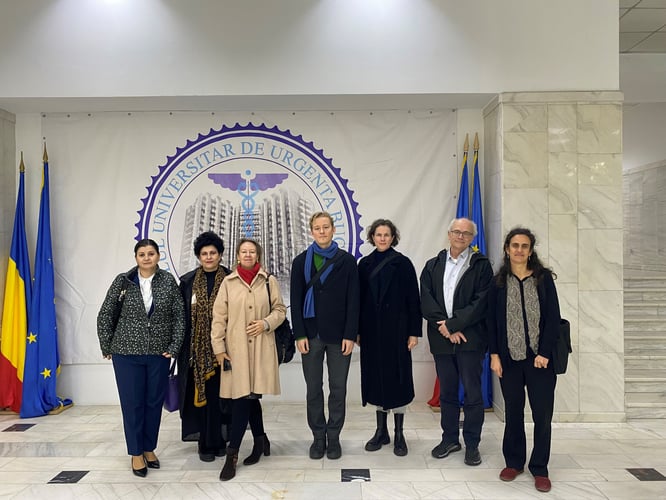Norway and Romania: A joint effort to combat sexual violence
Sexual violence is a serious and widespread issue in both Romania and Norway. In a joint effort to combat this form of violence, the two countries have launched the bilateral project RONOR - Stronger Together Against Gender-Based Violence.

The project’s aim is to strengthen Romania's existing sexual violence intervention centres by providing expert input from Norwegian professionals. The project has now reached a milestone following a recent conference in Romania and a subsequent visit to sexual assault centres in Bucharest.
"In a time marked by several global crises it is especially important to ensure women’s rights"
Romania has committed to implementing the Istanbul Convention, which aims to ensure protection for women from violence. Romania signed the Convention in 2014 and ratified it in 2016, with it entering into force on September 1st, 2016. In line with this, Romania has already established ten sexual violence intervention centres to assist victims, but there is still a long way to go, Carmen Niculescu says. She is project manager at the National Agency for Equal Opportunities for Women and Men (ANES) in Romania, and emphasizes the importance of focusing attention on sexual violence and gender-based violence.

"The RONOR project is a strategic initiative to strengthen Romania's efforts against gender-based violence, focusing on developing integrated policies and improving institutional mechanisms. We view this as an opportunity to improve the holistic approach to combat violence by strengthening intersectoral cooperation and developing effective protective measures," says Carmen Niculescu.
Niculescu points out that, in a time marked by several global crises such as migration, refugee crises, and armed conflicts, it is especially important to ensure women's rights and their protection from violence. She believes that cooperation between Norway and Romania in this area is crucial for achieving this goal.
A gap between words and actions
During the conference in Romania, Ole-Henrik Augestad, head of the Norwegian Rape Committee, shared his experiences and insights from working on the NOU 2024 report on rape. He was particularly focused on the similarities and differences that exist between Norway and Romania in dealing with sexual violence.

"Romania has strong political engagement to combat gender-based violence, but just like in Norway, there is a gap between words and actions. They have some impressive measures, but the challenge, according to some of the Romanians I spoke with, often lies in how to maintain continuity and effectively implement political goals at the ground level. We can share our experiences from Norway, where we have a more developed system, but we still have some of the same problems. There is still room for improvement," says Augestad.
He also highlights the cultural challenges Romania faces. In Romania, according to people engaged in gender-based violence services, strong masculine ideals still exist. This means that it can be difficult for women to seek help, and for men to acknowledge responsibility. This means that support services, such as the sexual violence interventions centres, must be tailored to both cultural norms and the specific situation in Romania.
WHO and the Holistic Approach
Melanie Hyde from the World Health Organization (WHO) emphasizes the importance of holistic cooperation to combat sexual violence. This means the importance of involving multiple sectors, including healthcare, the justice system, and social services, to create a cohesive system that supports victims and prevents recidivism.

WHO is engaged in efforts to update global prevalence data on violence against women and girls, and focuses on the critical role of the healthcare system in addressing both the immediate health issues and long-term consequences for survivors.
"The healthcare system plays a key role in responding to the acute health consequences of sexual violence and providing long-term support to survivors. This means that healthcare professionals must have a comprehensive understanding of all forms of violence, not just the physical harm, but also the psychological and emotional effects," says Hyde.
Norway as a Key Contributor
Both Ole-Henrik Augestad and Carmen Niculescu agree that Norway plays an important role in supporting Romania in this work, not only through financial assistance but also through professional collaboration and knowledge exchange. Augestad notes that Norway can contribute to three key areas: resources, political interest, and knowledge development.
"Romania can benefit from our experience with decentralized support services and our knowledge of how to work across sectors. At the same time, Romania has a strong commitment to improving its efforts against gender-based violence, and we can support them in realizing this," says Augestad.
Although developing a functioning infrastructure and good support system for survivors of gender- based violence is important, both WHO and Romanian experts points to the need of a more fundamental change in attitudes and society in order to prevent violence. This can involve everything from preventive work in schools to fostering broader public discussions on the seriousness of violence.
The Way Forward
There is no doubt that Romania still faces significant challenges in dealing with sexual violence, but through cooperation with Norway and international actors such as WHO, the country is on its way in developing more effective systems and better protection for women.
"This project is just the beginning. To truly make a difference, we all need to work together, learn from each other, and continually evaluate and adjust our approaches. It is an ongoing effort, and it will require a holistic commitment from both Romania, Norway, and the rest of the world," concludes Carmen Niculescu.
The collaboration between Norway and Romania through the RONOR project represents an important step in the fight against sexual violence, but it is a work that remains ongoing. With political engagement, international cooperation, and a holistic approach, we can hope for a future where violence against women is significantly reduced, according to Niculescu.
MORE ABOUT THE RONOR-PROJECT
“RoNor – Stronger together against gender-based violence!” is a bilateral EEA-project between Romania and Norway. The project is financed by the bilateral funds of Norway Grants in Romania 2014–21 at the level of the Justice Program. The National Agency for Equal Opportunities for Women and Men (ANES) in Romania is the project promotor and The Norwegian Ministry of Justice and Public Security has been the project partner.
Achievements so far in the project:
- The bilateral conference, titled “Building knowledge towards a golden standard gathering experience and good practices on the implementations of the Istanbul Convention”, was held in Bucharest from November 12th–13th, 2024.
- Onsite visits and stakeholder consultations in November 2024 and April 2025. These visits included visits for a Norwegian delegation, including international experts, to five sexual intervention centres and stakeholder’s consultations with representatives of the institutions responsible for the multidisciplinary intervention in cases of sexual violence at each location.
- A report titled: Improving Access to Healthcare and Justice for Sexual Violence Survivors Sexual Violence Intervention Centres in Romania will soon be published. The recommendations provided in the report will be actively applied in an information campaign promoting the intervention centres for victims of sexual violence in Romania
Messages at time of print 22 February 2026, 23:30 CET